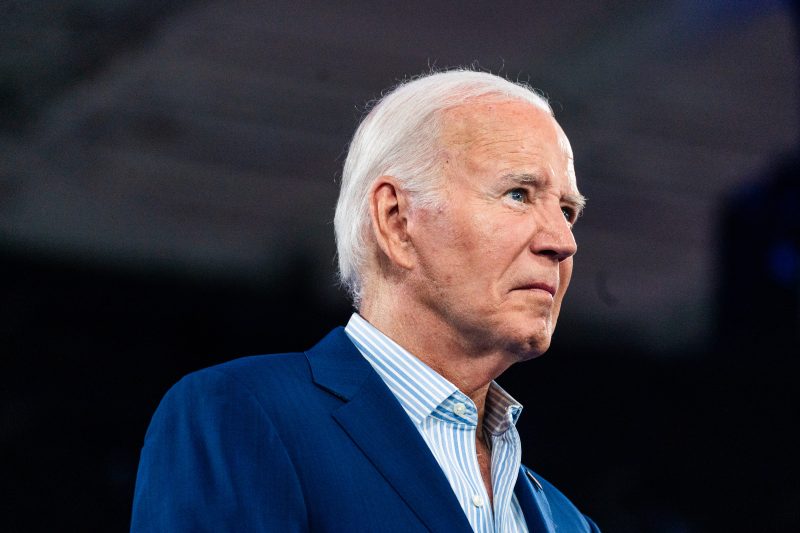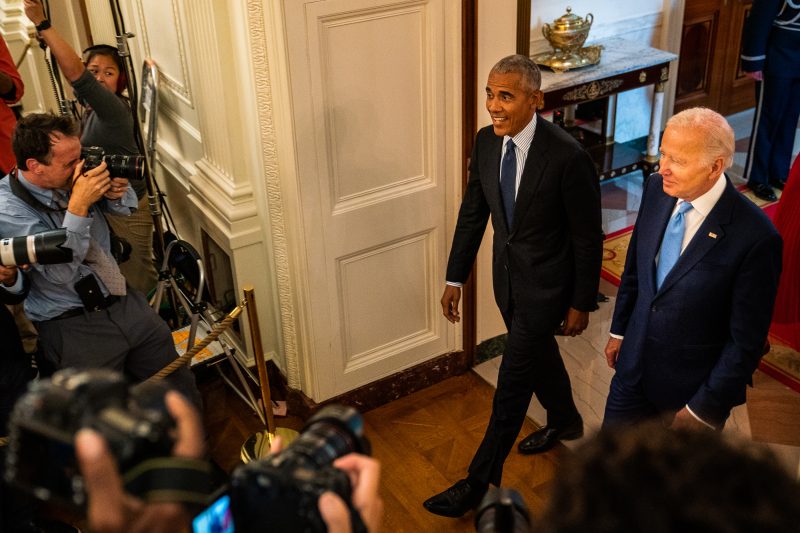Amid escalating pressure, Biden steps up efforts to reassure Democrats

A growing number of Democrats on Tuesday began publicly questioning President Biden’s performance in last week’s debate, calling on him to withdraw from the race, and contemplating possible successors, as the fallout spread from what increasingly appears to be a pivotal moment in the 2024 campaign.
Rep. Lloyd Doggett of Texas became the first sitting Democratic member of Congress to ask Biden to step aside, warning of the potential consequences if the president pushes ahead with his reelection effort. “He must not deliver us to Trump in 2024,” Doggett said.
Another House Democrat, Rep. Marie Gluesenkamp Perez of Washington, said she believes Biden “is going to lose to Trump” because of his debate performance — but she stopped short of calling for the president to leave the race.
Former House speaker Nancy Pelosi (D-Calif.), who has long been a strong ally of Biden’s, said it was legitimate to ask after his stumbles in the debate, “Is this an episode or is this a condition?” Rep. James E. Clyburn (D-S.C.), whose endorsement was pivotal in Biden’s 2020 win, said he would support Vice President Harris if Biden were to end his reelection bid.
Still, no party leaders explicitly called publicly for Biden to step aside, and the president’s team sought to push back against the voices of discontent. The president is planning to speak with congressional leaders and meet with Democratic governors Wednesday evening, after several days in which he kept a low profile even as his aides worked feverishly to tamp down the Democratic angst.
Biden also agreed to an interview Friday with George Stephanopoulos on ABC News, and is planning a news conference for next week.
The moves reflect a conclusion by Biden’s team that he urgently needs to become more personally involved in reassuring party leaders, as well as the public, that he is capable of continuing his reelection campaign.
Biden, at a fundraiser in McLean, Va., on Tuesday, expressed confidence as he downplayed his debate night struggles.
“I know I didn’t have my best debate night,” he said. But citing the $38 million his campaign has raised since the debate, he added, “So far so good. I’m feeling good about what’s happening.”
He noted that in the days before the debate, he made a trip to France for a D-Day commemoration and Italy for Group of Seven summit.
“I wasn’t very smart,” he said. “I decided to travel around the world a couple times, going through I don’t know how many time zones — for real, I think it was 15 time zones … I didn’t listen to my staff. And then I came back and nearly fell asleep onstage. At any rate, that’s no excuse, but it is an explanation.”
The Democratic Party has been embroiled in a crisis in recent days, after longtime concerns about Biden’s age and stamina were crystallized by the debate performance in which he sometimes struggled to complete sentences. Some Democrats have complained that Biden has not responded with sufficient urgency, saying he needs to hold more public appearances and engage more with party leaders.
Since the debate, Biden’s senior aides have been furiously calling top Democratic leaders and donors, but Biden as of Tuesday morning had not spoken with such top party figures as Senate Majority Leader Charles E. Schumer (D-N.Y.) and House Minority Leader Hakeem Jeffries (D-N.Y.).
On Monday, Gov. Tim Walz of Minnesota, who chairs the Democratic Governors Association, held a call with other Democratic governors to discuss Biden’s reelection campaign. Several participants expressed frustration that they had not heard personally from the president, according to a person familiar with the call, speaking on the condition of anonymity to discuss a private meeting.
It was those complaints that spurred the plans for a meeting between Biden and the Democratic governors on Wednesday, with the goal of focusing on the state of his campaign.
The party’s governors have been put in a sensitive position by the outcry after Biden’s debate performance. Many of them are among the president’s strongest backers and have been called on to reemphasize their support for his candidacy.
But some of the governors, including Michigan’s Gretchen Whitmer and California’s Gavin Newsom, are also rising political stars who have been suggested by Democratic donors and activists as potential replacements for Biden should he bow out.
Many in the party are anxiously awaiting the independent polls that are expected to emerge in coming days, showing whether Biden’s debate performance has cost him significant support.
“There is a lot of affection for Joe Biden in the party, but nothing motivates elected officials more than self-preservation. And if the polls slip members will begin to jump ship,” said Howard Wolfson, an adviser to Hillary Clinton’s 2008 presidential campaign who now works with former New York mayor Mike Bloomberg. “If there is one thing that members know how to read, it’s a poll.”
And if surveys begin to suggest that Biden’s support is dropping to a degree that it could hurt Democratic Senate and House candidates, that could prompt those candidates to abandon him, Wolfson suggested.
“I guarantee you that every member in a competitive race is already in the field with a poll or about to be,” he said. “And if the data comes back bad, members are going to look for the exits.”
In another sign of the turbulence engulfing Democrats, Sen. Joe Manchin III (W.Va.) told a few key allies after the debate that he planned to break with Biden in an appearance on a Sunday news show — a potentially dramatic defection by a high-profile figure.
Top Democrats got wind of the plans and started calling Manchin — who recently registered as an independent but caucuses with Democrats — and urged him to reconsider, according to two people familiar with the response who spoke on the condition of anonymity to discuss private conversations. Manchin ultimately decided not to go on the Sunday show.
After the debate on Thursday night, Biden held a rally in Raleigh, N.C., and hosted several fundraisers, before returning to the presidential retreat at Camp David to spend two days with his family.
Biden arrived at the White House on Monday night, speaking before a bank of television cameras to deliver sharp criticism of a Supreme Court decision declaring that Donald Trump was immune from prosecution for his official actions when he was president.
Overall, the president’s schedule for the week has been light. On Tuesday, he attended a briefing on extreme weather at a D.C. emergency operations center — where he gave remarks warning of the dangers ahead this summer and lambasted climate change-denying Republicans — and later was to attend a fundraiser in McLean, Va.
White House press secretary Karine Jean-Pierre said Tuesday that Biden had a robust schedule planned for the coming days, including a campaign appearance in Wisconsin and an address to the National Education Association in Philadelphia.
Jean-Pierre alternated between openly wishing the Biden team could turn the page on the debate, while also saying that she understood the reason for questions from reporters about Biden’s sometimes elderly appearance.
“We understand. We are not taking away from what you all saw, what the American people saw,” Jean-Pierre said. “We understand it was a bad night. It is not uncommon for incumbents to have a bad night on their first debate. And we are going to continue to do the work that we have been doing on behalf of the American people.”
She said that while Biden had a cold during the debate — and, she said, still does — he was not on cold medication at the time.
Some Democratic leaders began speaking Tuesday with something less than an unequivocal endorsement of Biden staying in the race. Pelosi, for example, said that she had heard “mixed” reactions in the aftermath of the debate.
“I think it’s a legitimate question to say, ‘Is this an episode or is this a condition?’ When people ask that question, it’s legitimate — of both candidates,” Pelosi said on MSNBC.
Trump attracted his own share of criticism for his debate performance for making a large number of false statements, but his delivery was relatively crisp and did not prompt a revolt among members of his own party.
“I’m not a doctor. I can’t say what happens three, four years down the road,” Pelosi added. “But I think that in my experience, which is what you asked me, I think that he will continue to be a great president.”
She also said that it was “essential” for Biden to do several interviews that would be “no-holds-barred, any-question-is-fair” to showcase his abilities and signal that the debate performance was an aberration, not a revelation.
But other cracks in the Democratic edifice, albeit small, began to appear.
Clyburn, who has been one of Biden’s most important political allies, said on MSNBC that he would support Vice President Harris if Biden were to step aside. Clyburn did not suggest that should happen, but it signaled that some prominent Democrats were beginning to at least envision a post-Biden landscape.
Adam Frisch, a Democratic candidate for a competitive House seat in Colorado, said bluntly that Biden should end his reelection campaign. “It has been apparent to me for some time — and the debates only reinforced it — neither candidate is fit for president,” Frisch said in a video. “We deserve better. President Biden should withdraw from this race.”
That statement came shortly after Doggett released a statement calling on Biden to drop out.
“I had hoped that the debate would provide some momentum to change that. It did not. Instead of reassuring voters, the President failed to effectively defend his many accomplishments and expose Trump’s many lies,” Doggett said in the statement. “President Biden saved our democracy by delivering us from Trump in 2020. He must not deliver us to Trump in 2024.”
Doggett noted that he represents the heart of a congressional district that was represented by President Lyndon B. Johnson when he was a House member.
“Under very different circumstances, he made the painful decision to withdraw,” Doggett said, referring to Johnson’s decision not to seek reelection in 1968, amid the Vietnam War. “President Biden should do the same.”
Michael Scherer contributed to this report.




